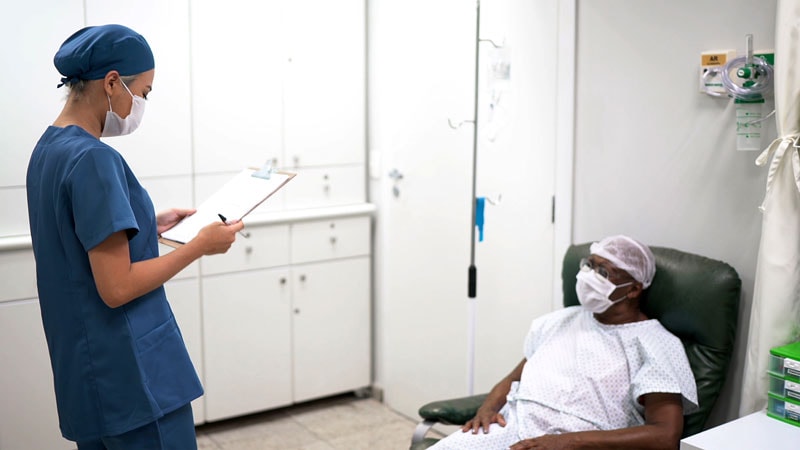Many have predicted that the lockdowns and restrictions to contain the COVID-19 pandemic will lead to delays in diagnosis and treatment of cancer, and will eventually result in worse outcomes. Now there are data to show that this may indeed be the case.
The data come from France, where the first mandatory lockdown (from March-May 2020) lasted 55 days: people had to stay home, and leaving the house was strictly controlled by police. Many medical services were suspended.
The study analyzed data collected during the enrollment phase for a phase 2 clinical trial. As part of the procedure, participants had a blood test to allow analysis of circulating tumor DNA (ctDNA, which was used as a measure of tumor burden).
The team looked at patients who were screened during two periods — before the lockdown (from November 11, 2019 to March 9, 2020) and after lockdown (from May 14, 2020 to September 3, 2020, a 112-day period).
They found that individuals diagnosed with metastatic colorectal cancer (mCRC) after the lockdown had a tumor burden nearly seven times higher than those diagnosed before the pandemic.
In addition, among patients with the higher tumor burden, median survival decreased from 20 months to just less than 15 months.
“The differences in tumor burden between patients who were diagnosed before vs after lockdown and the resulting risk of reduced survival point to the association between the pandemic-related lockdown and unfavorable consequences for patients with newly diagnosed mCRC, who may have delayed their first visit to an oncologist,” the researchers comment.
“To our knowledge, this study was the first to assess the association between COVID-19 restrictions and delayed treatment and diagnostic services for a specific cancer,” the researchers noted.
“I think that reasons for diagnosis delays are similar in the US as in France,” commented lead author Alain Thierry, PhD, director of research, Institut de Recherche en Cancérologie de Montpellier, France. “They imply individual reluctance or fears or difficulty of carrying out a screening test or to visit a medical doctor or an oncologist during the lockdown period,” he told Medscape Medical News.
The study was published online September 8 in JAMA Network Open.
Seen in Clinical Practice
“The results of this study are highly believable, and certainly consistent with what I have seen in my own practice,” commented Theodore S. Hong, MD, director of gastrointestinal services at Mass General Cancer Center, Boston, Massachusetts.
CRC, and gastrointestinal cancers in general, often present with vague, nonspecific symptoms, he continued. “Delayed screening very likely leads to advanced cancers, and it is highly likely that the pandemic raised the threshold that patients would seek medical care for subacute symptoms,” he said. “This is leading to many patients presenting with advanced gastrointestinal cancers.”
Delays and Projected Outcomes
The COVID-19 pandemic put an unprecedented burden on global health systems, and had substantial implications for cancer care. Routine care (eg, screening) delayed, and patients were often reluctant to come to healthcare facilities for fear of infection with COVID-19. For example, a study in April from the American Cancer Society Cancer Action Network found that half of the cancer patients and survivors who responded to a survey conducted during the lockdown last year reported changes, delays, or disruptions to the care they were receiving.
Perhaps most daunting was a model created by the National Cancer Institute that predicted tens of thousands of excess cancer deaths would occur over the next decade as a result of missed screenings, delays in diagnosis, and reductions in oncology care caused by the COVID-19 pandemic.
Norman “Ned” Sharpless, MD, director of NCI, said at the time: “I am deeply concerned about the potential impacts of delayed diagnoses and deferred or modified treatment plans on cancer incidence and mortality.” He also predicted that the number of excess deaths per year would peak in the next year or two, likely sooner for colorectal than for breast cancer, but “for both cancer types, we believe the pandemic will influence cancer deaths for at least a decade.”
Worse Outcomes After Lockdown
The study from France involved patients with metastatic CRC who had participated in the PANIRINOX phase 2 clinical trial, which compared treatment with FOLFIRINOX + panitumumab (Vectibix) to treatment with FOLFOX + panitumumab.
To enroll in this trial, patients were stratified by RAS and BRAF status determined from circulating tumor DNA (ctDNA) analysis.
For the current study, the authors looked again at the ctDNA, but this time looked at ctDNA concentrations, and used this as a marker of tumor burden.
The median ctDNA concentration was statistically higher in patients who had received their cancer diagnosis after lockdown as compared with those diagnosed before lockdown (119.2 ng/mL vs 17.3 ng/mL; P < .001). In addition, patients with metastatic colorectal cancer and high ctDNA concentration also had lower median survival vs those with lower concentration (14.7 [95% CI, 8.8 – 18.0] months vs 20 [95% CI, 14.1 – 32] months).
Thierry and colleagues now plan to examine the full consequences of the lockdown in regards to patient survival in a future 3-year survival study.
“Our data points first to the crucial importance of early detection,” said Thierry. “Second, to maintain screening programs and diagnostic services during a pandemic and third, to the needs of requiring intervention to minimize a patient’s fears by ensuring high communication/information.”
The PANIRINOX study was funded by Amgen and sponsored by Unicancer Research and Development. Co-author Brice Pastor, PhD, was supported in part by grant INCa_Inserm_DGOS_12553 from SIRIC Montpellier Cancer. Thierry was supported by INSERM.
Thierry has disclosed being a shareholder of DiaDx SAS; several co-authors report relationships with industry as noted in the paper. Hong reports consulting for Synthetic Biologics, Novocure, Boston Scientific, Inivata, and Merck; serving on the scientific advisory board for PanTher Therapeutics (Equity) and Lustgarten; and has received research funding for clinical trials from Taiho, Astra-Zeneca, BMS, GSK, IntraOp, Ipsen, and Puma.
JAMA Netw Open. Published online September 8, 2021. Full text
For more from Medscape Oncology, join us on Twitter and Facebook

